Customer Stories
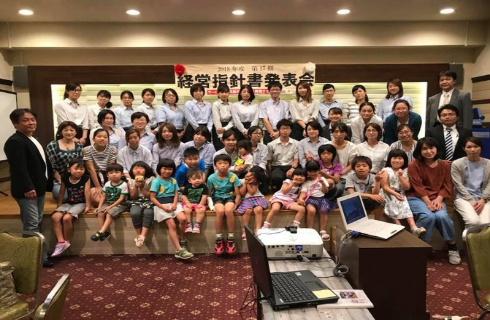

Cleaning services
Meet the Japanese company O-soji de tsukuru yasashii mirai, whose name can be roughly translated to cleaning for a kinder future. For them, Kintone has served as an invaluable tool for everything from motivating isolated cleaning staff to decreasing reporting workload and creating jobs in far-off areas not covered by their physical offices. We spoke with Representative Director Masashi Maeda to hear more about how the company utilizes Kintone to support their staff across Japan.
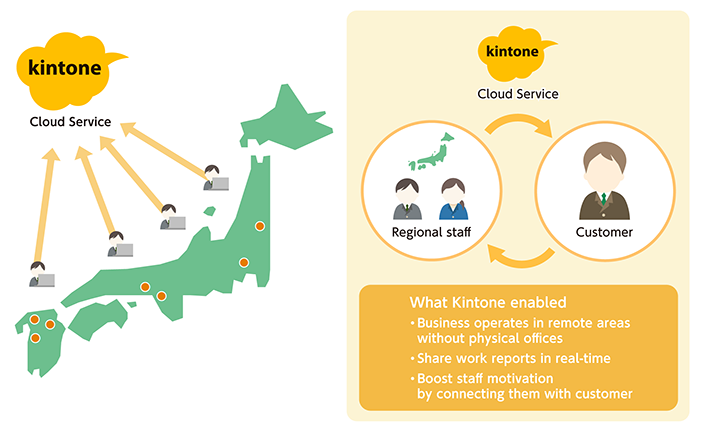
Masashi’s cleaning business has expanded well beyond its main office in Fukuoka, located in Southern Japan. Operating without a single regional office, the company has expanded to 11 major urban areas throughout Japan, from Sendai city in the Tohoku region in the north, to Kumamoto in the south.
Masashi tells us more about his motivations for starting the company: "People tend to assume our business is about cleaning, but we're actually about creating - creating a kinder future. Our goal is to work together across generations to create compassionate, safe communities that encourages their inhabitants to start a family."
The company currently operates as a cleaning subcontractor for approximately 700 properties across Japan, with their cleaning projects centered on property common areas, including entrance areas, hallways and garbage collection points. This business profile is rooted in the company's workforce. Ninety-seven percent of the employees are women - and with the exception of a handful of fresh graduate hires - most of them are working mothers.
Masashi explains: "Our strength as a company lies in the working mothers that support our business, but also makes it difficult for them to work on a demanding schedule. By choosing to specialize in real estate common area projects, which can accommodate a more flexible working schedule, we sought to align our services with the priorities of our greatest strength - our staff, instead of trying to conform to our customers."
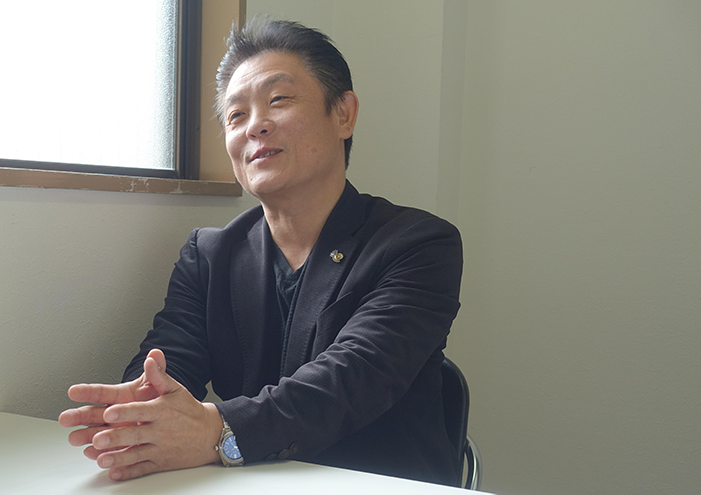
Masashi's business started out small, but quickly began to grow as more mothers in the community joined over the years. They were attracted not only to the company's time-flexible work policies, but also its social commitment to building a better future. This affinity for the company's vision translated into highly motivated staff and satisfied customers who spread the word and ensured a rapid increase in business volume.
It was around this time the company was asked to take on the cleaning of an apartment complex roughly two hours away from the main office in Fukuoka.
Masashi explains: "We couldn't very well ask working mothers to spend four hours of their day just to get to and from the cleaning site, so we knew we had to come up with an alternative solution. Since getting our staff from Fukuoka to the property was out of the question, we decided to look for individuals, mainly mothers, residing in the area who could take on this project in their spare time."
Although a recruitment drive on social media resulted in the successful hiring of new staff in the local area, the company was now faced with a new problem: how to maintain the motivation of remote staff you would never physically meet?
Masashi remarks: "No matter what job you're in, motivation and work performance are closely connected. Our newly hired remote staff had no office to come into and were cut off from their colleagues. Finding a way to keep them motivated was a big issue for us."
Masashi's first encounter with Cybozu's services came after he sought advice from a telecommuting consulting service operated by Fukuoka prefecture. They referred him to a consulting company that advised him to try out Cybozu Office.
In Masashi's words: "They described the software as the best service for building an environment where even remote workers can feel included in the workplace.”
Masashi decided to sign up for Cybozu Office, and the company was ultimately able to build a platform that enabled the staff to share information and carry out their tasks regardless of location.
However, faced with further expansion and a rising number of employees, Masashi felt the need to bolster staff motivation even further.
"Feeling appreciated is an essential prerequisite for feeling motivated. Unfortunately, mothers are not used to their children or husbands showing appreciation for all the things they do for their families on a daily basis. Put differently, most mothers are too accustomed to their hard work and sacrifices going unnoticed. That is all the more reason why being recognized and appreciated can be a strong source of motivation for them."
This realization inspired Masashi to find a way to get their clients more deeply involved with the staff. Above all, he needed a tool that would make it easier to communicate and share information with external stakeholders. That's where Kintone comes in.
Masashi excitedly explains:
"The idea was to encourage customers to feel a more personal connection with our hard-working cleaning staff by encouraging them to communicate on Kintone. After adopting Kintone we started to see positive changes. Customers no longer talked about some nameless 'cleaning lady' but would refer to the cleaning staff by name. Some customers also took the time to leave comments on Kintone showing their appreciation for our service. For the first time ever, our staff was able to see and feel first-hand how their efforts had value. Repeat this kind of experience, and eventually people will feel a sense of commitment to building a community that is free from pollution and inspires its inhabitants to start families. Ultimately this fosters a desire to build a kinder future for our children that we can take pride in."
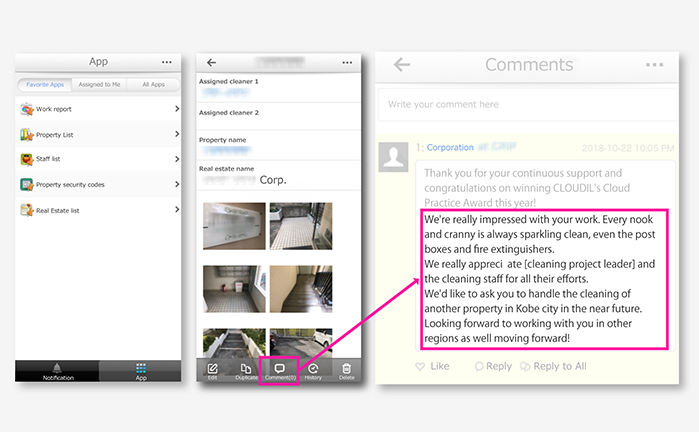
Their Kintone setup is simple and down-to-earth and centers on multiple master directory apps, each app containing a list of certain data. One app has a list of all properties, another of all staff members, a third lists all real estate properties. There's also an app keeping track of security codes for entering property common areas. The platform also features a work report app where staff upload photos taken with their smartphones of the property before and after the cleaning and share information on the cleaning tasks they performed.
This work report app serves as the backbone for sharing data with customers. Before starting a cleaning assignment, the assigned staff logs into Kintone, which automatically records the start time. Once the assignment is done, the staff submits their report and records the end time. Most customers have a Kintone account and can thus peruse the work reports and reach out using the app's comment section if they have any questions. The app's user-friendliness, both on desktop PCs and smartphones, has significantly reduced the time needed for staff to submit their work reports, reportedly to the great surprise of many staff members.
As Masashi explains: "Many people associate cleaning companies with physical labor and still living in the non-digital age. A lot of our new staff are pretty shocked when they see how we conduct our business using Kintone." The information that can be accessed by each account is carefully controlled, ensuring that customers can only access information about their own properties.
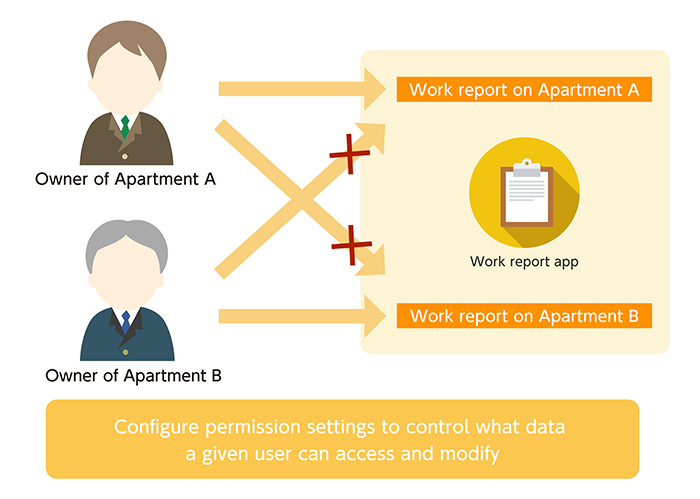
How Kintone drastically reduced the time required for writing and submitting work reports to customers.
Masashi elaborates on how Kintone has positively impacted his business:
work report app, all the customer has to do if they need a hard copy is to press the print button. We've been able to eliminate the time and resources needed for printing and posting. I reckon we've reduced the workload associated with reporting by about two thirds - which is a lot. It also used to take us about a month to deliver the reports, which could really delay the property owner's response to issues brought up. Now that we've been able to streamline our work reports, the owner can immediately take action if the re are any issues."
Although the real estate industry has been taking small steps in going digital, Masashi's business is ahead of the pack in terms of employing a completely paperless platform, giving the company somewhat of an advantage in the market.
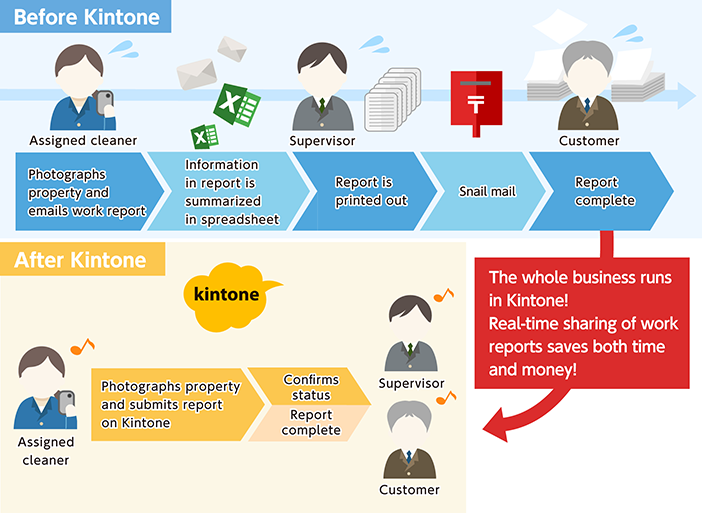
The business is doing well, having grown its initial portfolio of about 100 properties to 700 properties. On a fundamental level however, the focus of Masashi's ambitions is not to expand the business.
"Our revenue has definitely gone up, but that's not what I'm happy about. What makes me happy is that even as a small business in Fukuoka, we've been able to create new jobs as far away as Tohoku in Northern Japan. What's more, we've been able to provide employment for people who wanted to work but were unable to due to time constraints."
Masashi also tells us he is immensely proud of the fact that his business succeeded in creating an environment that has enabled all staff, including those based in remote areas without an office, to provide a consistently high level of service.
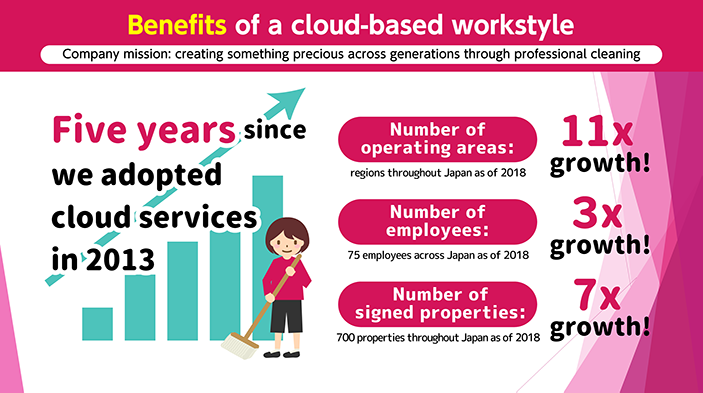
In the future, the company is looking to use Kintone as a knowledge base that integrates cleaning manuals and on-premises expertise, and also implement functionality for supporting activities by linking it to map information so that cleaning staff can move between multiple sites efficiently.
Masashi elaborates: “Some of our staff in Sendai have been asking for an app to manage their attendance and to procure supplies such as cleaning tools. Some of the staff in Sendai were willing to get involved and offered to create the app. I think this was possible because of how easy it is to create apps in Kintone.”
Masashi also expressed his enthusiasm for utilizing Kintone as a sales office in the cloud in the future.
“For example, in some countries in Africa, drones have already been implemented in society, and the traditional idea of building roads to deliver medicines is no longer relevant. In other words, the very idea of physically setting up a sales office can be a hindrance to moving to the next stage of technological advancement. Knowing that Kintone can provide a digital workplace for all staff no matter where they are, I really want to add even more practical features to Kintone, in order to make cloud-based sales offices the new norm."
Masashi concludes by quoting a saying attributed to the Japanese Buddhist monk Saicho:"
Even the smallest lights can illuminate a nation when united.Cleaning may seem trivial, but I believe it has the potential to light up our communities as it spreads across Japan. I would like to share my philosophy and vision with Japan’s amazing working mothers and together use Kintone and other technologies to illuminate our communities.”
Kintone Product Introduction Video
